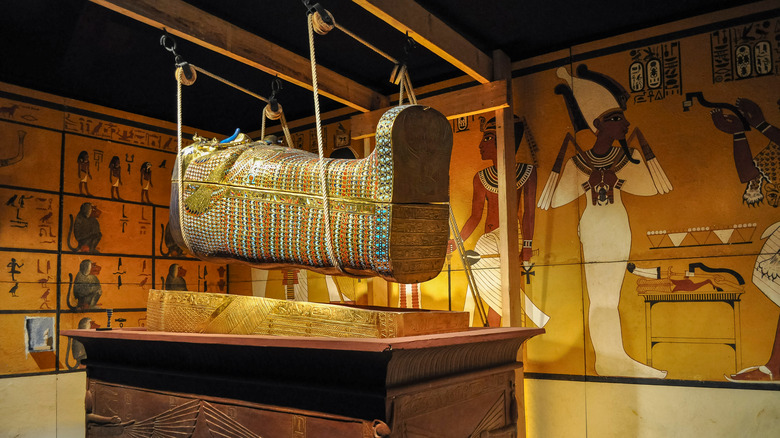Why Ancient Egypt's Cocaine Mummies Hint At The Existence Of Atlantis
Yes, it's a lot to take in. The embalmed dead of an ancient civilization, a mythological city that sank into the ocean, and an addictive white-powdered narcotic produced from plant leaves: How could these things possibly be connected? On the surface it seems like a stretch, if not a shark-jumping veer into absurdity land. But there's a simpler tie between the three than might be apparent. Take a dab of global geography, stir it with cross-continental trade routes, toss in a generous serving of religious rituals, and presto: instant deduction.
To start, let's go back to ancient Egypt in northeastern Africa, a civilization that flourished for almost three millennia starting in 3000 B.C.E. Egypt was steeped in mysticism and magical rites. The recently translated "Handbook of Ritual Power" contains spells and invocations to induce love, evoke spirits, cleanse the body of possession and illness, and lots more, per Live Science. Almost the entirety of Egyptian life, in fact, was bent around spiritual preparation for an eternal afterlife, as History Today explains. And like many other cultures, hallucinogens were part and parcel of Egyptian religious life. Case in point: "cocaine mummies" like that of priestess Henut Taui — mummies with traces of cocaine in their bodies (per Cansford Laboratories).
The only problem? Coca doesn't grow anywhere near Egypt — it grows across the ocean in modern-day South America, as the DEA Museum explains. How did it get across the sea, then? Either the Egyptians traveled the Atlantic Ocean, or someone traveled to them.
Salvaging Atlantis
If you have any knowledge of ancient timelines or events, you might have spotted a couple of issues already. Egypt, as a civilization, didn't exist in any cohesive form until about 3100 B.C.E., as the Australian Museum points out. Atlantis was first mentioned by Plato in his 360 B.C.E dialogue, "Timaeus," as existing about 9,000 years before then, per National Geographic. That means there's a 6,000-year gap between Atlantis and Egypt. Even barring the possibility of cross-oceanic sailing, how could there be any connection between the two?
To go further, we've got to assume that Plato at least took inspiration from some real-life, overseas locale that represented ideas about vanity and immorality that he was trying to convey in "Timaeus." As National Geographic explains, many scholars believe that this is precisely what "Atlantis" meant to Plato: A storytelling device to describe the follies in his own Athenian society. Atlantis, he said, grew too arrogant and pleasure-seeking, and blamo — the gods wiped them out.
There are a number of candidates that Plato might have used for inspiration when envisioning Atlantis, most notably the wealthy maritime nation of Minoa. Located on the Mediterranean island of modern-day Crete, Minoa fell to ruin for a variety of reasons, including the eruption of a volcano on the nearby island of Thera between 1611 and 1538 B.C.E., per The Collector. Some, however, think it's much simpler than this and point to ancient maps. Atlantis, as Big Think recounts, might just be South America.
Where the coca grows
So is it possible that ancient Egyptians got their cocaine from Atlantis? To answer yes, it's not even necessary to believe that a separate, Atlantean continent got swallowed by floods at the end of the last Ice Age. Maybe Atlantis was just South America. After all, Vikings sailed to North America before 1021 C.E. and even settled there, as a study published in the journal Nature says. That's about 500 years before Columbus's often-rhymed 1492 Caribbean excursion. Couldn't folks from Egypt have forged forth on the ocean long before then, too? Research like that published in the Journal of Ancient Egyptian Interconnections points to Egyptians having mastered sea travel as well as Nile-bound river travel.
There are other potential Atlantean candidates that fit Plato's timeline, notably Spartel Island between Spain and Morocco. Spartel Island got consumed by rising ocean levels about 9,000 years ago, right when Plato described Atlantis' destruction, per New Scientist. And yet, no coca plants grow there. But Egyptian cocaine had to come from somewhere, right? If not, then the data from chemical analyses of Egypt's cocaine mummies is false.
And to be sure, researchers have questioned the authenticity of the testing conducted on the cocaine mummies simply because the idea of Egyptian maritime travel seems far-fetched. Cansford Laboratories waffles a bit on committing to one side, but ultimately admits the validity of radioimmunoassay and gas chromatography/mass spectrometry tests conducted on Egyptian mummies. Results showed traces of cocaine, again and again.


